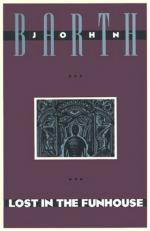|
This section contains 6,327 words (approx. 22 pages at 300 words per page) |

|
SOURCE: "The Novelist as Topologist: John Barth's Lost in the Funhouse," in Texas Studies in Literature and Language, Vol. XIX, No. 1, Spring, 1977, pp. 83-97.
In the following excerpt, Vitanza analyzes the properties of the Möbius strip from "Frame-Tale," arguing that the story contains the framework for the entire collection and supports Barth's attempt to generate new meaning out of exhausted literary forms and themes.
"Like the mathematician … the novelist makes things out of concepts."
—William H. Gass, "A True Lie-Minded Man"
"Was there any new thing to say, new way to say the old?" This question, asked by the character Anonymous in the final section of John Barth's Lost in the Funhouse, reveals the central concern of the novel. Barth considers essentially the same problem in the essay "The Literature of Exhaustion," written contemporaneously with many of the sections that compose Funhouse, when he says that in...
|
This section contains 6,327 words (approx. 22 pages at 300 words per page) |

|


